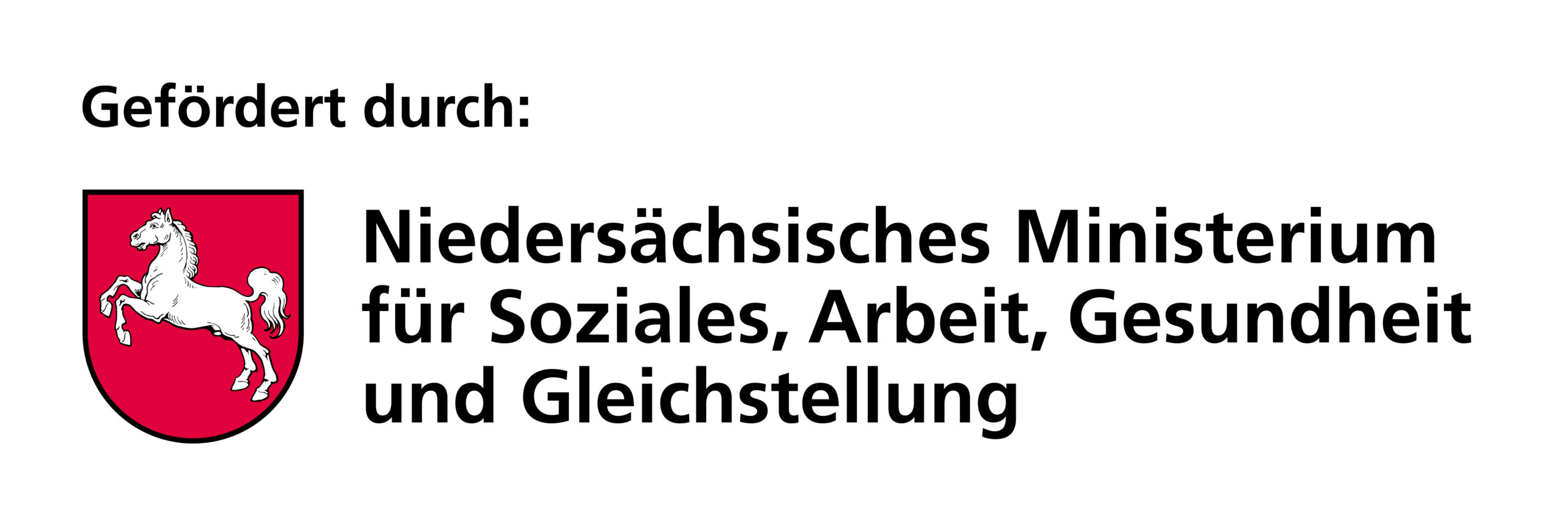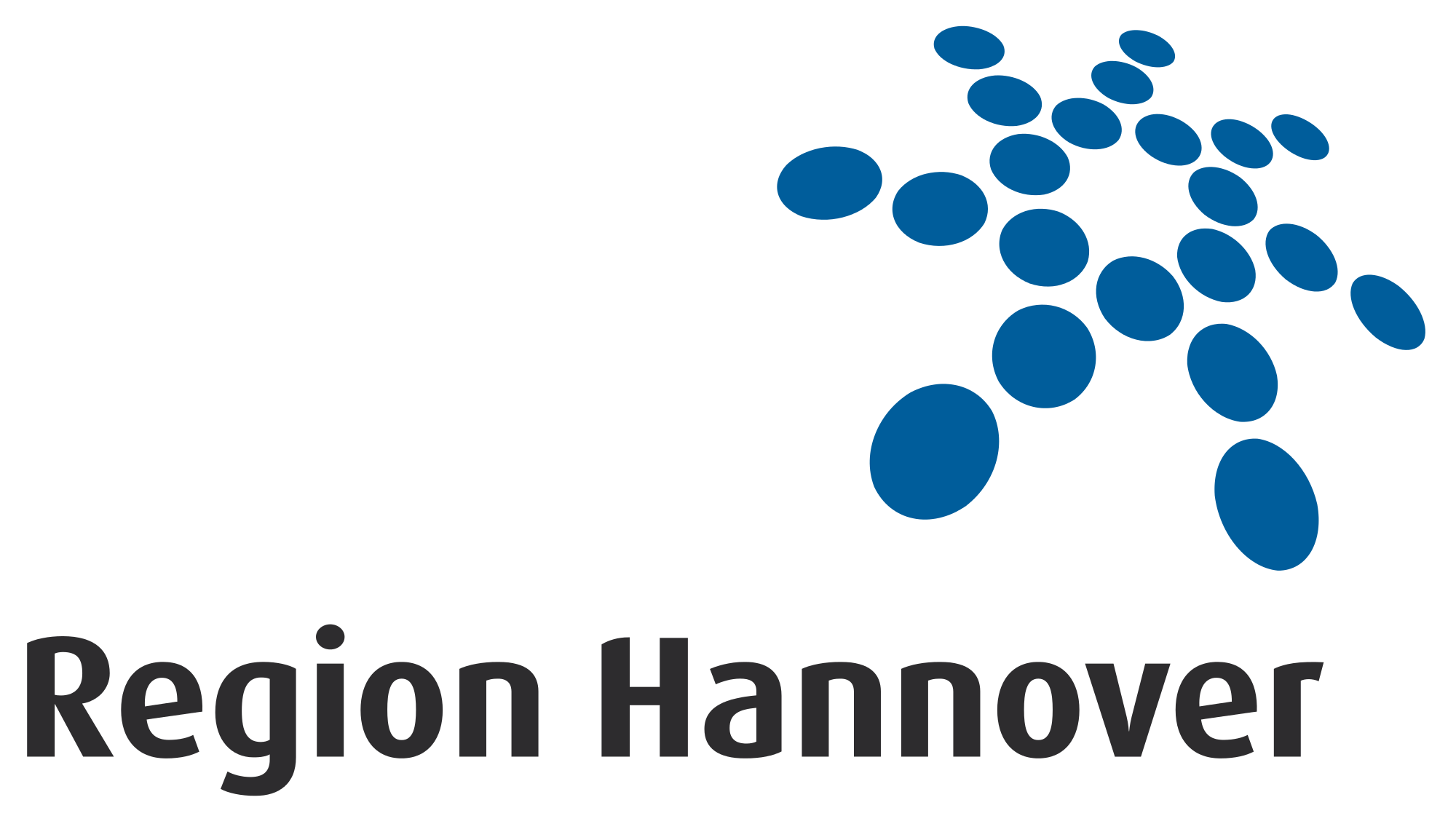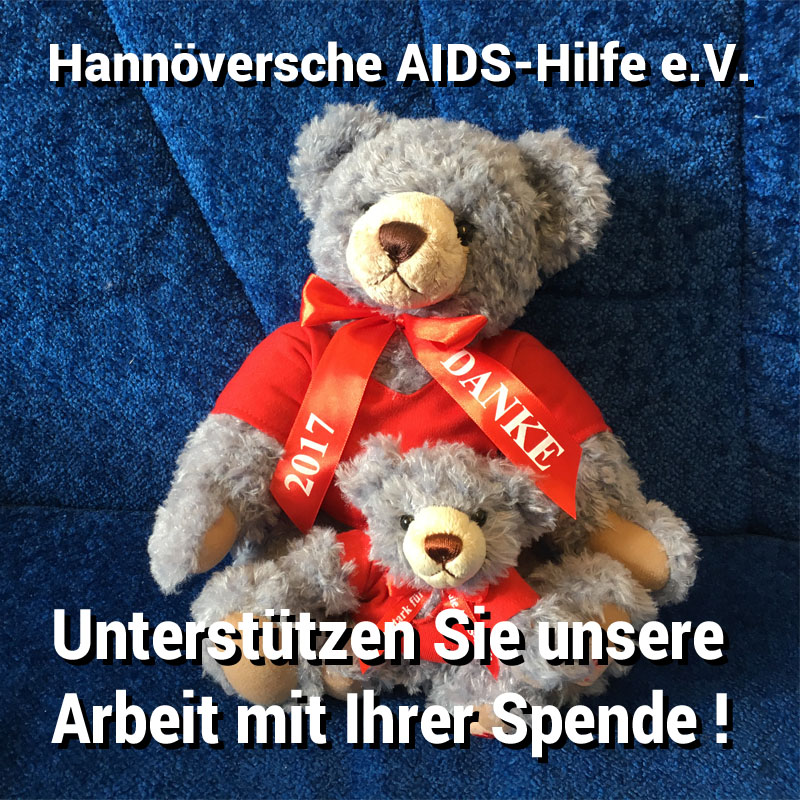About the Hannover Aidshilfe e.V.
and CheckPoint Hannover
The Hannover AIDS-Hilfe e.V. has been committed to helping people with HIV since 1984, providing support for self-help and target group-specific educational work to prevent new infections.
However, the name “AIDS-Help” only describes our tasks to a limited extent today: fortunately, we only very rarely see the full-blown picture of AIDS, and thanks to modern therapies, people with HIV can live and work completely normally. They hardly need “help” any more.
We are, therefore, moving into the future with the new label “CheckPoint Hannover, Counseling Center for Sexual Health.” If we want to prevent HIV infections and other sexually transmitted infections, we need to identify and treat them early, before they are transmitted further and before they cause irreparable damage to our health.
However, sexual health is more than just the absence of sexually transmitted diseases. We are, therefore, also committed to sexual and gender diversity and to a self-determined, pleasurable experience of sexuality and oppose all forms of discrimination and moralization. Because only those who can appreciate and love themselves, their bodies and their health can protect themselves and their partners.
Living with HIV today
The image of AIDS and the tasks of the Hannöversche AIDS-Hilfe e.V. have changed fundamentally since the founding of the organisation. In the 1980s, in addition to educating the frightened population, the activists’ commitment still consisted mainly of providing end-of-life care for people with AIDS.
Although a cure for HIV infection is not yet possible despite intensive research, HIV can now be optimally controlled if detected and treated in time thanks to modern medicine. Almost all people with HIV now have a normal life expectancy with a good quality of life and a normal ability to work. The prerequisite, however, is that the medication is taken reliably for life.
Full-blown AIDS, which almost all HIV-positive people suffered and died from in the 1980s, is now only seen very rarely and usually when the HIV infection was detected far too late. However, thanks to antiretroviral HIV therapies, it is now possible to restore a functioning immune defense in almost all cases.
The massive side effects that HIV therapy still had around ten years ago have now also disappeared thanks to the further development of medication and medical treatment.
The realization that people with HIV can no longer transmit the HIV infection to others after successful treatment has also brought significant relief for people with HIV. The Federal Commission for AIDS Issues in Switzerland (EKAF) came to this initially very controversial conclusion back in 2008. Since then, several studies have shown that HIV medication suppresses the replication of the virus in the body to such an extent that there are hardly any free viruses left in the secretions, thus making it absolutely impossible for the virus to overcome an uninfected person’s own immune defenses. For people with HIV and their partners, this makes it possible to live out barrier-free sexuality (i.e. without a condom), and it is also possible to have children naturally. It is assumed that most HIV infections today come from people who have just been infected and, therefore, have a very high viral load in their blood and secretions.
What tarnishes this image is now mainly the stigma attached to people with an HIV infection. The realization that it is absolutely impossible to transmit HIV in everyday contact with HIV-positive people has been proven since the early 1980s and has been communicated ever since, and not just by AIDS service organizations. Nevertheless, outdated images of HIV combined with completely irrational fears of infection persist in the minds of many people. Added to this is the assumption that people with HIV are guilty of acquiring an HIV infection and have indulged in irresponsible desire through sex or drug use. What is forgotten is that pleasurable experiences always have something to do with relinquishing control. HIV-positive people have internalized this attribution of guilt.
Combating Stigma and Discrimination
Combating HIV-related stigmatization and discrimination associated with HIV infection and working with and for people who are exposed to this stigmatization and discrimination are central focuses of today’s AIDS service work. This activity has always been one of the tasks of Hannöversche AIDS-Hilfe e. V., but in 2016 we established an anti-discrimination office explicitly for this purpose. People with HIV who feel unfairly treated or disadvantaged due to their HIV infection, or who have even been attacked through words or actions, can contact us. We will then work together to find and implement possible solutions to the conflict.
In order to counter and prevent structural and institutional discrimination, we have created specific training courses for people who are in everyday contact with people with HIV. In 2016, for example, training courses for dentists and dental assistants were designed and carried out in collaboration with local HIV focus practices, as adequate dental treatment without unnecessary special measures for people with HIV is not standard in all practices. We also offer these training courses for other professional groups or colleagues of people with HIV.
Advice and Support for People with HIV
Counseling and support for people with HIV in difficult life situations has become no less important since the founding of the organisation. From the processing of an HIV-positive test result, through to conflicts in the partnership, to the topic of HIV in old age, a structured conversation with a counselor and sharing information can contribute to processing or overcoming a difficult situation. The basis for this is our accepting attitude towards the lifestyles of our clients.
Even though most people with HIV now have a normal working life, it is often the recipients of public benefits who turn to us for advice. The complicated application process and securing of unemployment benefits, social assistance, pension or benefits under the Asylum Seekers Benefits Act, and the necessary cooperation with the relevant authorities is a major challenge – and not only for people with a migration background and language barrier. Our social counseling staff help people with HIV through the application and objection procedures as well as mediate with authorities.
We also offer other support services for vulnerable groups, such as substitution patients, men* who have sex with men*, women* and people with a migration background.
Sexual Health Education
The declared focus of CheckPoint Hannover’s activities is the prevention of new infections with HIV and other sexually transmitted infections (STIs) through target group-specific educational work. Today, HIV is transmitted sexually in almost all cases, approx. 12% via intravenous drug use. According to estimates by the Robert Koch Institute, around 2,000 people are newly infected with HIV in Germany every year, just over half of them through contact between men who have sex with men (see RKI 2021). These infection figures are very low by international standards, not least due to the effective prevention work of AIDS service organizations.
Our prevention work is largely supported by our volunteer teams. The SVeN team (Schwule Vielfalt erregt Niedersachsen – Gay Diversity Excites Lower Saxony), for example, is out and about in the gay and queer scene in Hanover under this Lower Saxony-wide label of the AIDS service organizations. Information on protection options is passed on in a fun, easy-to-understand way. The target group is empowered to protect themselves effectively against HIV and other sexually transmitted infections.
Our school prevention program starts much earlier. Suitably trained HIV-positive volunteers talk to school classes from year 8 onwards about living with HIV from their own perspective and provide information about protection options. In this way, prevention and anti-discrimination work is carried out simultaneously.
Only those who know their current HIV status can protect themselves and their sexual partners from transmission. Furthermore, the earlier an HIV infection is detected, the better it can be treated. For this reason, the Robert Koch Institute and the Federal Ministry of Health have been calling for an expansion of low-threshold testing services for years. Hannöversche AIDS-Hilfe e.V. has been offering a rapid HIV-syphilis combination test three times a month in the evenings since 2014, which provides reliable information on the status in just a few minutes. In addition to this, we have also been offering a sexually transmitted infections test for sexually active people since 2016. Both testing services are carried out by volunteer doctors in close cooperation with the Hannover Region Health Department.
History of the Hannover Aidshilfe e.V.
In 1981, an unusual form of pneumonia and a rare form of skin cancer, Kaposi’s sarcoma, occurred more frequently in gay men, first in the USA and then for the first time in Germany in 1982. These phenomena were apparently due to an acquired immune deficiency, as was soon correctly assumed. This disease was initially called Gay People’s Immuno Defiency Syndrome (GIDS). The German media, above all Der Spiegel, soon reported extensively on this new gay epidemic, although there was ultimately no clarity about the exact causes of the disease. Although it was suspected as early as 1983 that it could be traced back to a transmissible pathogen, HIV was not confirmed as the actual cause until March 1985.
These reports were also read with concern in the Hanoverian lesbian and gay center HOME e.V. in Johannsenstraße. Although no concrete cases of AIDS had yet been reported in Hanover, the gays here were also worried about the disease and, above all, about government reprisals. Conservative parties were already calling for those affected to be barracked and for the gay subculture to be suppressed as a supposed nucleus.
In 1984, discussion evenings were convened in the group room of the HOME center to exchange the little information available and to find a common political direction. These meetings gave rise to the idea of founding an AIDS-Hilfe in Hanover, following the example of the Deutsche AIDS-Hilfe e.V. in Berlin, which had been founded a year earlier. After Berlin, Munich and Hamburg, this was the fourth AIDS-Hilfe in Germany.
Even back then, the aim was to collect and pass on serious information about AIDS, i.e. to raise awareness. The first leaflets were typed up on typewriters and distributed at information stands at Kröpcke on Saturdays when shops were open. In addition to a lot of rejection, there was also a lot of interest and solidarity. For example the then manager of Café Kröpcke provided the activists with fresh coffee.
At the time, Lower Saxony was governed by the CDU with Minister President Albrecht. The newly founded association approached the state government early on to make itself available as a competent point of contact for the gay subculture, but also to request funding for the necessary educational work. The state of Lower Saxony accepted this offer, as they had no idea what the gay subculture in Hanover and Lower Saxony looked like, let alone how to take educational and preventative action there.
The Hannöversche AIDS-Hilfe soon received an initial sum of several thousand marks from the Lower Saxony Ministry of Social Affairs. This was spent primarily on the production of leaflets, but also on a telephone helpline that was soon set up and operated in the conservatory of the first chairman, Werner Noelle. The organization also became active throughout the state by looking for activists in some of Lower Saxony’s larger cities to support the establishment of further AIDS service organizations in their towns. This soon led to the establishment of AIDS-Hilfen Oldenburg, Wilhelmshaven, Celle and Lüneburg. Overall, the Hanover AIDS service organization made efforts to further expand its lobbying work. New volunteers joined the organization. Bernd Weste, the current honorary chairman of Hannöversche AIDS-Hilfe e.V., initially joined the advisory group, but soon took on board responsibility. He has played a key role in the organisation ever since.
In 1985, the first case of AIDS appeared in Hanover. Billa Müller (her self-chosen pseudonym) was heterosexual (!) and had probably contracted HIV from her drug-using boyfriend. She had heard about the Hannöversche AIDS-Hilfe e.V. in the media and approached the founders of the AIDS-Hilfe, who were all gay, for support. She urgently needed their help. Due to little reliable information being available, many false reports and the resulting widespread fear, she met with a lot of rejection: doctors did not want to treat her, nursing staff only wanted to touch her – if at all – under massive protective measures, friends and family kept their distance. Although she was already severely weakened by AIDS, Billa Müller, with the support of members of Hannöversche AIDS-Hilfe e.V., took a proactive approach to her illness. She publicly admitted her infection in talk shows and on the radio and thus became a symbol of the fact that the supposed gay epidemic AIDS does not stop at anyone.
Kontakt:
Management & Coordination CheckPoint
Jürgen Maaß
Telefon: 0511 / 360 696 16
j.maass@hannover.aidshilfe.de
Ulf Theuerkauf
Telefon: 0511 / 360 696 0
u.theuerkauf@hannover.aidshilfe.de
Christine Berthold
Telefon: 0511 / 360 696 19
c.berthold@hannover.aidshilfe.de
Project “Sex, drugs & a gay life”
Sebastian Bathge
Telefon: 0511 / 360 696 13
s.bathge@hannover.aidshilfe.de
Project “Yalla sawa
Anmar Thamer
Telefon: 0511 / 360 696 15
a.thamer@hannover.aidshilfe.de
Benjamin Roth
Telefon: 0511 / 360 696 17
b.roth@hannover.aidshilfe.de
Telefon: 0511 / 360 696 19
a.neumann@hannover.aidshilfe.de



